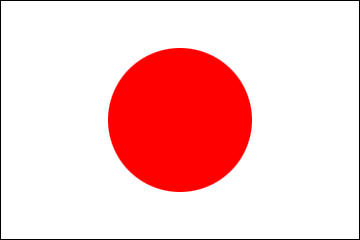Through the Eyes of the former Consul General Yamada (June, 2017 - July, 2020)
2018/7/10

Music of Remembrance and Memorial Day
The Holocaust. The Nazi-led genocide of the Jewish people is a haunting memory that torments not only the Jews, but also the conscience of humankind to this day. The Jewish people have strived to educate others about this dark time in history by creating Holocaust remembrance centers all over the world so that humanity will not forget this lesson and that the memories will not fade with time. In Seattle there is a prominent center that welcomes students and people from all sorts of occupations and educates them on the Holocaust. For example, a large group of police officers were at the Center during my visit in August of last year.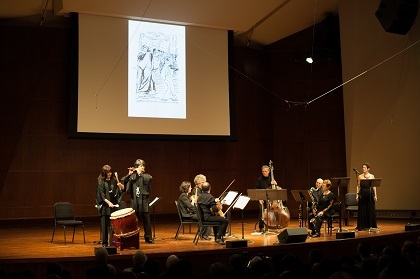
Music of Remembrance. Photo Courtesy of MOR, Jared Chang, photographer
There is also a unique project in Seattle that hopes to convey the memories of the Holocaust to future generations through music. The project is called Music of Remembrance and was launched by Ms. Mina Miller. She gathers performers and regularly holds concerts twice a year, performing works by Jews who lost their lives in the Holocaust and musical pieces based on their lives. Seattle Mayor Jenny Durkan praised this project that celebrates its 20th anniversary this year and declared May 20 “Music of Remembrance Day.”The persecution of certain races, ethnic groups, religions, etc. is not limited to the Holocaust. Seattle’s Jewish community has also been trying to draw out important historical lessons from the incarceration of Japanese Americans after Pearl Harbor as an instance of racial prejudice. At an event held on International Holocaust Day on January 27 of this year, there was dialogue specifically on the history of Japanese Americans. Similarly, Ms. Miller made the history of the incarceration of Japanese Americans a theme for the 20th season of Music of Remembrance this year. At the concert last November, she also showcased a performance of Ryuichi Sakamoto’s work that has the topic of civilian victims from the Hiroshima and Nagasaki atomic bombs, as well as a musical accompaniment of Kiyoko Nagase’s poem, “Furitsumu” (Falling Down) with an English translation that was done by Empress Michiko.
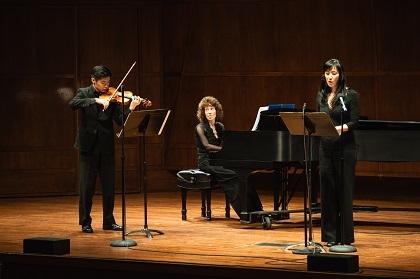
Music of Remembrance – Snow Falls. Photo Courtesy of MOR, Jared Chang, photographer
On May 20, the opera “Gaman,” produced and composed by French musician Christoph Chagnard, premiered at a Music of Remembrance concert that had the theme of incarceration experienced by Japanese Americans. In order to compose the piece, Chagnard read a lot of literature and interviewed dozens of Japanese Americans. I believe this could only have been done in Seattle. Seattle is a city where many Japanese and Japanese Americans lived before the war. This area was from where the first of the removals of people of Japanese ancestry took place, and from where many young people who participated in the 442nd Infantry Regiment, some of whom lost their lives, hailed. The opera performed to a full house and many people were seen standing to watch the performance.
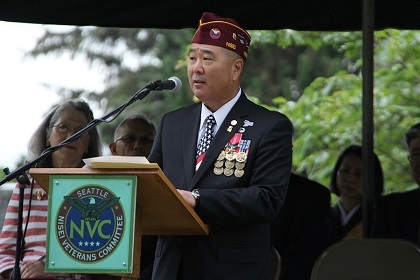
NVC Memorial Day Service, Walter Tanimoto, Commander of NVC. Photo Courtesy of NVC Foundation member Kim Muramoto
May 28 is Memorial Day. It is a U.S. holiday that commemorates those who died in war. The Nisei Veterans Committee held a Memorial Day service, and I also attended. I was told that it always rains on this day, but fortunately, this year had a clear sky. There are only three remaining veterans of the 442nd Infantry Regiment who reside in Seattle. The following day, The Seattle Times posted a photograph of Frank Nishimura, one of the three veterans, on the front page and reported on the ceremony of Japanese American veterans.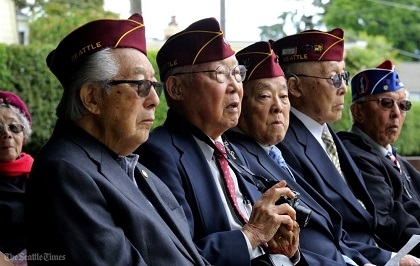
NVC Memorial Day Service. Photo taken by Seattle Times Staff Photographer Alan Berner, courtesy of NVC.
